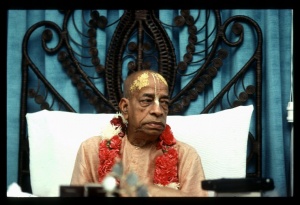CC Adi 17.14: Difference between revisions
No edit summary |
(Vanibot #0054 edit - transform synonyms into clickable links, which search similar occurrences) |
||
| Line 17: | Line 17: | ||
<div class="synonyms"> | <div class="synonyms"> | ||
''tabe'' | ''[//vanipedia.org/wiki/Special:VaniSearch?s=tabe&tab=syno_o&ds=1 tabe]'' — thereafter; ''[//vanipedia.org/wiki/Special:VaniSearch?s=catuḥ&tab=syno_o&ds=1 catuḥ]-[//vanipedia.org/wiki/Special:VaniSearch?s=bhuja&tab=syno_o&ds=1 bhuja]'' — ''four-armed; ''[//vanipedia.org/wiki/Special:VaniSearch?s=hailā&tab=syno_o&ds=1 hailā]'' — became; ''[//vanipedia.org/wiki/Special:VaniSearch?s=tina&tab=syno_o&ds=1 tina]'' — three; ''[//vanipedia.org/wiki/Special:VaniSearch?s=aṅga&tab=syno_o&ds=1 aṅga]'' — body; ''[//vanipedia.org/wiki/Special:VaniSearch?s=vakra&tab=syno_o&ds=1 vakra]'' — curved; ''[//vanipedia.org/wiki/Special:VaniSearch?s=dui&tab=syno_o&ds=1 dui] [//vanipedia.org/wiki/Special:VaniSearch?s=haste&tab=syno_o&ds=1 haste]'' — in two hands; ''[//vanipedia.org/wiki/Special:VaniSearch?s=veṇu&tab=syno_o&ds=1 veṇu] [//vanipedia.org/wiki/Special:VaniSearch?s=bājāya&tab=syno_o&ds=1 bājāya]'' — blowing the flute; ''[//vanipedia.org/wiki/Special:VaniSearch?s=duye&tab=syno_o&ds=1 duye]'' — in two (hands); ''[//vanipedia.org/wiki/Special:VaniSearch?s=śaṅkha&tab=syno_o&ds=1 śaṅkha]-[//vanipedia.org/wiki/Special:VaniSearch?s=cakra&tab=syno_o&ds=1 cakra]'' — conchshell and disc. | ||
</div> | </div> | ||
Latest revision as of 18:36, 19 February 2024
Śrī Caitanya-caritāmṛta - Ādi-līlā - Chapter 17: The Pastimes of Lord Caitanya Mahāprabhu in His Youth

His Divine Grace
A.C. Bhaktivedanta Swami Prabhupada
A.C. Bhaktivedanta Swami Prabhupada
TEXT 14
- tabe catur-bhuja hailā, tina aṅga vakra
- dui haste veṇu bājāya, duye śaṅkha-cakra
SYNONYMS
tabe — thereafter; catuḥ-bhuja — four-armed; hailā — became; tina — three; aṅga — body; vakra — curved; dui haste — in two hands; veṇu bājāya — blowing the flute; duye — in two (hands); śaṅkha-cakra — conchshell and disc.
TRANSLATION
Thereafter the Lord showed Him His four-armed form, standing in a three-curved posture. With two hands He played upon a flute, and in the other two He carried a conchshell and disc.